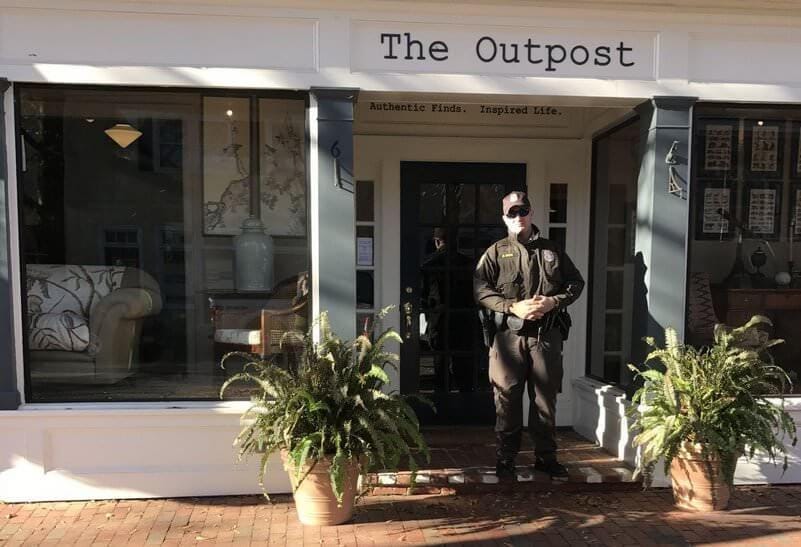Unclean Hands: Keith Foster’s Descent From Golf Architecture Wizard To International Smuggler
- Updated: January 25, 2019
 @GeoffShac
@GeoffShac
Keith Foster is usually in England this time of year. But this year is different: Foster is a felon now, waiting to learn if he’s going to prison.
For more than 30 years, Foster has been one of golf course architecture’s brightest minds. A specialist in renovating the classics, dirt under Foster’s fingernails had been shaped before him by some of the game’s titans of design: A.W. Tillinghast’s Philadelphia Cricket Club, C.B. Macdonald’s Old White course, and Perry Maxwell’s Southern Hills Country Club, among many others.
But in December, Foster pled guilty in federal court to importing and selling more than a quarter-million dollars in items made from endangered species.
When he’s sentenced on March 8, Foster probably will escape prison time altogether, or receive very little (he faces up to five years, but federal courts rarely dole out maximum sentences).
That’s not to say that he’s escaped consequences, though. Foster’s plea deal required him to forfeit $275,000 and to give up nearly 200 items made from endangered species.
His career is an endangered species now, too.
Days after Foster pled guilty, Congressional Country Club in Maryland and Olympia Fields Country Club in Illinois fired him from renovation jobs at their courses. Foster might never hear a cell door slam shut behind him, but undoubtedly, the doors of many of his high-profile clients are closed to him forever.
And for what? Why would a golf course architect at the top of his field risk his career and freedom for some mounted birds and crocodile skin wallets? What was Foster chasing that ultimately led him into this snare?
“I want to be surrounded with stuff that’s real, and this is awesome, inspiring stuff. It lasts for generations.”
Keith Foster, to Golf Inc. magazine (Winter 2012)
Foster’s guilty plea hit the golf world like a bolt of lightning from a clear blue sky: shocking, unforeseeable. But in hindsight, it was the predictable end of a long, slow creep toward the edge that Foster had been risking for years.
http://gty.im/119031263Understand: the U.S. Department of Justice is no band of fools.
It is patient; it is methodical. It never sets the hook until the fish takes all the bait, and it almost always reels the fish in. Its prosecutors spend months – sometimes years – building mountains of evidence before revealing themselves. By the time the fish feels the hook, it’s already in the boat.
At least as far back as 2012, Foster was trying to import items made from endangered species, which violates a federal law called the Lacey Act. That year, he was caught trying to smuggle an illegal leopard skin rug to sell at his Virginia antique store, the Outpost. American officials seized the rug and essentially let Foster off with a warning. Catch and release.
One brush with a federal crime would’ve been enough for most people. But not only did Foster keep smuggling … he did it almost openly.
For two months each year, Foster traveled to England to find illegal merchandise for the Outpost.
“Every January and February, my wife and I travel abroad to buy cool authentic stuff that we then ship back home to offer and sell,” Foster told Golf Club Atlas in 2014. “I return home in early March, get the shop ready to go and open in early April. At the same
It’s not clear whether Foster believed these purchases were technical violations which, like the 2012 incident, risked no more than slaps on the wrist — or, alternatively, whether he understood that he was risking serious prison time. But what is clear is that Foster knew full well that he was breaking federal law.
http://gty.im/1086383720“My wife, who is fantastic, she reminds me, ‘Keith, you just need to learn how to say ‘no’ more.’ And that’s hard. All of us want to please our clients.”
Keith Foster, on The Fried Egg podcast (November 2017)
A podcast deep dive
The Internet’s deepest dive into what makes Foster tick is his November 2017 appearance on The Fried Egg podcast. Predictably, the conversation focuses mostly on Foster’s philosophy toward golf course architecture.
But architecture aside, Foster is impossible not to like: he is warm, generous with his time (the interview runs 77 minutes), and unabrasive (he approaches the podcast’s “Overrated/Underrated” segment by asking for permission not to answer if he thinks it might hurt someone’s feelings). He speaks lovingly of his wife, and he says that he commits at least one day per week putting aside his work and spending time with family.
In hindsight, though, the interview shows glimpses of a Gatsby-like figure, surrounding himself with the trappings of success to compensate for more meager beginnings. Foster mentions his childhood in blue-collar South Philadelphia, growing up only miles away but a world apart from the elite Philly Cricket Club that he’d later shape.
http://gty.im/538823322“I played golf on a municipal golf course, because my parents, we weren’t country club people,” Foster told podcast host Andy Johnson. “So I grew up on a municipal golf course because we couldn’t afford anything better. And I learned
Early in his career, Foster shunned a large portfolio to focus on something that he returned to over and over throughout the conversation with Johnson: quality.
“In the end, I’m not measuring how much work I’m doing,” Foster said. “I’m trying to do enduring work. I’m not trying to do more work. And my gauge is ‘great.’ And I just want to be part of great.”
In a world where we now know Foster was smuggling, his answer to one listener question is especially foreboding: writer Geoff Shackelford asked Foster to name his favorite piece of memorabilia.
Foster laughed at the question, then paused before beginning: “Alright so, many of your listeners and all this stuff, they don’t know, you know, maybe a lot about me. And probably that’s a good thing, but OK. So I’m a golf course architect, but I’ve always liked antiques, collectibles, things like this. But I love the game of golf, obviously.”
The interview revealed another part of Foster’s personality that contributed to his downfall: confidence in reading other people. Foster explained that, when talking to potential clients, he could always tell quickly whether they’d work well together.
“Based on my relationship with them, their relationship to me, you know, it either affirms or confirms that I should or shouldn’t be there. And that’s key. Because ultimately, I’m going to be forming a close relationship with these people that I’m going to be working with. They’ve gotta trust me, and I’ve gotta trust them. We’re working on this thing together.”
He later added: “I don’t really look at flaws. Like my wife will say, ‘My gosh, Keith,’ — you know, about this person, or that person, and I just don’t hear anything negative. I don’t see anything negative, I don’t hear anything negative, and I don’t ever dwell on anything negative.”
Enjoying the climb
The social ladder wasn’t the only thing Foster spent his life climbing. In his late 40s, Foster fell for mountaineering.
“I liken it to what I do on a renovation program,” Foster told Golf Club Atlas in 2014. “The training required is like the design component while the actual climb is much like the field element but in a more compressed timeline.”
Mountains are a safe place for men warding off a midlife crisis. A single climb can take months of preparation, and once you’re done, there’s always more to explore. You never run out of mountains. The next high is always waiting for you.
“Climbing is a test where you put yourself against something huge and epic,” Foster told Golf Inc. magazine in 2012. “A mountain is a place that’s uncomfortable, and you have to get comfortable with not being comfortable.”
And mountains don’t judge; they are Earth’s ultimate meritocracies. They don’t care whether you’re from South Philadelphia. They don’t know whether you grew up playing Merion or FDR Golf Club. If the time is right, and if you’ve put in the work and you deserve to reach the top, then you do.
Mountain climbing is dangerous, of course. But that’s part of the attraction.
http://gty.im/1064245496RELATED: Architecture Geek: Is The 18th At Kapalua A Good Hole?
By December 2016 – two years before his guilty plea – Foster had grown too comfortable with not being comfortable. The feds had him, and he didn’t even know it.
That month, he began working with an Outpost customer interested in purchasing sawfish blades for about $1,000 apiece. Foster knew this was illegal; “they are extremely difficult to bring in the States by the way,” he told the customer in an e-mail.
What Foster didn’t know was that the customer was an undercover federal agent.
Foster sold a blade from an endangered sawfish and a mother-of-pearl table to the customer for $1,150. At this point, the Justice Department had Foster dead to rights. But federal prosecutors are a patient lot.
They left the bait, and Foster kept taking it: over the next 11 months, Foster and the Outpost sold thousands of dollars in more illegal merchandise to the undercover agent: a box made from a sea turtle, a crocodile skin flask, more sawfish blades, and other items.
At one point, Foster bragged to the undercover agent about smuggling 36-inch tortoise shells into the U.S. “They’re endangered, so you know, they’re a problem bringing those in,” Foster told the agent. But “rest assured,” Foster said, “I’m gonna bring more in. Cause I’m the only fool in the States that probably wants to risk it.”
Coincidences take all shapes and sizes.
You and your golf partner wearing the same quarter-zip on the same day is a coincidence. So is appearing on a podcast the same day that federal agents raid your home and business.
On November 17, 2017 — the same day that Foster’s interview on The Fried Egg went live, f
It was over. All of it. Foster had to know it. Anyone would have known it.
And yet, unbelievably, Foster continued.
Two months after the raid – two months after anyone with half a brain would realize that he was being watched by people with the power to send him to prison – Foster made his annual smuggling trip to England.
Among the nearly 600 items he shipped home was a card table made from rosewood —
Foster knew that the table was illegal. He smuggled it anyway. Two weeks after Foster’s return from England, the table went for sale at the Outpost for the handsome price of $3,600.
Foster’s behavior – and the hubris with which he went about it – is hard to square with the picture painted by former colleagues.
“I knew Keith both as a person and as a golf course architect,” said Southern Hills Country Club general manager Nick Sidorakis, where Foster did touch-ups large and small for nearly 20 years. “Both had tremendous qualities. He had great character, a great personality. He was reserved, a true gentleman.”
Foster was not a risk-taker, Sidorakis said. He wasn’t rash. “He was a consummate gentleman and an even better person.”
He worked as a minister during the 1990s, according to two former colleagues, but was demure about it. “Keith seemed to keep most of that to himself,” a fellow architect said.
Foster could be intense, though. Steve Forrest, who worked with Foster at Arthur Hills’ architecture firm in Foster’s early days, remembers him as brimming with enthusiasm.
“The last time I spoke to him was three or four years ago, and it was right before the Super Bowl,” Forrest said. “I asked him if he was going to watch the Super Bowl, and he said, ‘Steve, I’ve got so much to do, I don’t spend time watching other people.’”
Foster spent the late 1980s recruiting new clients for Hills out west. His design career didn’t take off until he left Hills’ firm. But even that wasn’t entirely on the up and up.
“It’s probably the only time a golf course architect ever opened a firm with three architects,” Forrest said. Foster had been putting his team together while still working for Hills.
“Personally, like right now in my career, I would love to do that because I hope that I’m becoming a better person.”
Keith Foster, on The Fried Egg podcast
How the heck does this happen?
How does a mild-mannered golf course architect wind up smuggling endangered species? Why would someone at the top of his profession risk it all — especially for something so completely unrelated to golf?
Maybe it was nothing to do with golf: maybe it was an obsession with the genuine article, or a compulsion for risk-taking, or a desire to be viewed by East Coast elites as one of them, or a chase for the next big high.
Or maybe golf course construction and smuggling have more in common than any of us would like to admit. Both idolize natural beauty, but beneath the surface of that beauty lies a hypocrisy that neither wants to confront.
To be sure, some golf courses prioritize a true balance between the game played on its fairways and the ecosystems surrounding those fairways. But the overwhelming majority of golf courses are dumping grounds for fertilizers, pesticides, and other chemicals, all of which eventually wind up in waterways.
As Tom Doak wrote in The Anatomy of a Golf Course in 1992: “The political reality is that for the 90 to 95 percent of the public who are not golfers, the use of pesticides and fertilizers on a golf course carries absolutely no benefit, so why should they be willing to tolerate any risk, actual or perceived?”
http://gty.im/469977899Foster’s smuggling operation was at least as selfish. An endangered crocodile should slide closer to extinction so that some jerk can have a nice wallet; a smalltooth sawfish should be maimed and left for dead so that Foster could make a thousand bucks.
Foster didn’t do any of this because he’s a “Captain Planet” villain. Clearly, he’s not evil. By Foster’s own description, the Outpost was a labor of love for him. He loved beauty; he loved quality; only the best was good enough.
“Keith was all about quality and detail on the golf course, and keeping with the original intent of the architect,” said Southern Hills’ Sidorakis.
Quality, attention to detail, obsession with authenticity, not settling for “good enough:” these were what made Foster a great architect. As a smuggler, he deemed those desires (consciously or not) to be more important than the planet that he hurt along the way.
How are we golfers less culpable?
If Foster ever underestimated the risk to his freedom, then those illusions are gone now.
Foster’s lawyer is Ed MacMahon, Jr., who is no stranger to high-stakes prosecutions. Among MacMahon’s clients have been Zacarias Moussaoui (who conspired to participate in the September 11 attacks) and Jeffrey Sterling (a CIA analyst convicted of disclosing details of a covert operation).
Bottom line: you
Understandably, MacMahon declined to make Foster available for this story. “He’s a very kind and generous man who made a mistake,” MacMahon said at the time of Foster’s plea.
One of the factors that federal courts consider when handing down a sentence is whether the defendant has accepted responsibility for his behavior. The last thing that any lawyer would want is for his client to say something off-handed that sounds flip and endangers the appearance of remorse.
Foster’s lawyer isn’t the only one staying tight-lipped. Some of Foster’s former colleagues declined to comment for this story. Maybe they too are hoping that Foster can maintain his regretful image long enough to avoid prison. Maybe they’re just embarrassed to have a felon so unerasably connected to the work they did together.
“How much life do any of us have? I never want to be afraid to live the life I want to live.”
Keith Foster, to Golf Inc. magazine (Winter 2012)
Whether Foster’s cloak of silence will save him from prison is anyone’s guess until March 8: the federal prosecutor handling Foster’s case is not expected to make a specific sentencing recommendation to Judge Leonie Brinkema (who, coincidentally, is the judge who sentenced MacMahon’s former client Moussaoui to life in prison in 2010).
But any fair look at Foster’s case will show that MacMahon is wildly downplaying Foster’s behavior. Foster didn’t make a mistake. A mistake is a momentary lapse of judgment. What Foster did, he did eagerly, over and over, for years. If he hadn’t been busted (three times), then he almost certainly would have continued. It is no exaggeration to say that Foster spent years making the planet a worse place. Prisons are full of men who did less.
Foster isn’t a bad guy. But he wasn’t charged with being a bad guy, he was charged with smuggling. And he pled guilty.
We’ll never know why he did it, but we know what he did. And what he did is what he deserves to be sentenced for.
Even so, Foster might be able to convince Judge Brinkema that he has atoned for his sins. Court filings in Foster’s case are conspicuously vague about the people who helped him smuggle goods from England to the U.S., and federal prosecutors are always eager for bigger fish.
Throw in the fact that more than a year elapsed between the November 2017 raids and Foster’s guilty plea, and it’s not hard to imagine that Foster might have helped the Justice Department narrow in on his accomplices.
(Foster’s plea deal required him “to cooperate fully and truthfully with the United States, and provide all information known regarding any criminal activity as requested by the government.” The agreement also contains an acknowledgment by prosecutors that Foster “has assisted the government in the investigation and prosecution of the defendant’s own conduct.”)
The fact that plea agreements exist is proof that courts sometimes forgive bad behavior when it’s convenient.
Golf has a long, sordid history of doing the same thing. For the sake of remaining a free man, and the sake of working again, Foster is counting on both the justice system and golf to do it again.
For legal/credibility purposes: Will Bardwell (@willbardwell) is a Civil Rights lawyer by day and moonlights as a contributor for Two Inches Short.
This piece includes original reporting from sources we contacted along with prior reports to connect the dots on this unique case.
Sign up today for free and be the first to get notified on new updates. Subscribe to our mailing list!
Purchase the latest gear at the Two Inches Short Am Shop!
Follow TIS on Twitter, Instagram, and Facebook




